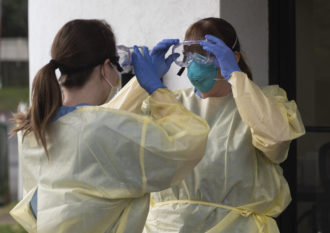Ten percent of the people known to have been infected with COVID-19 in Georgia are health care workers, state figures show.
The Public Health data, as of midday Thursday, show that of the 2,600 infected health care personnel in the state, 81 percent are female. Half are African-American.

Workplace exposure to COVID-19 patients is a major cause.
A recent CDC report found that infected health care workers reported contact with COVID-19 patients in health care, household and community settings. But the majority said the exposure occurred in health care settings.
Georgia nurses, in separate surveys, have voiced concern about inadequate personal protective equipment, a problem that has been identified nationwide. PPE, such as gloves, gowns, face shields, and N95 respirator masks, can protect nurses and other workers from being infected by patients.
Current state data do not list how many health care workers have died. Overall, the COVID-19 pandemic has sickened more than 26,000 people in the state and killed more than 1,100, according to the latest figures.
“We have been very concerned that no one in Georgia is tracking morbidity and mortality among nurses related to the COVID-19 pandemic,’’ said Lisa Eichelberger, an RN and dean of the College of Health at Clayton State University,
The only information about nurses with COVID-19 infections or deaths come from reports to the Georgia Nurses Association Rapid Response Committee, or from personal accounts, she said.

“Nurses probably spend the most time in prolonged contact with COVID-19 patients when they are hospitalized so it would not surprise me if they majority of the health care workers infected were nurses,’’ Eichelberger said.
GHN recently reported the COVID-19 death of a Piedmont Henry Hospital nurse. The AJC reported this week that her death is being investigated by the Occupational Safety and Health Administration, based on allegations that an unsafe work environment at the Stockbridge hospital exposed the employee to the virus. The complaint is among dozens that OSHA is looking into involving recent deaths of health care workers across the U.S.
The toll that the disease has taken on health care workers can be seen in Georgia’s long-term care facilities and state-run hospitals.
More than 1,500 employees of nursing homes, assisted-living facilities and personal care homes have tested positive, according to state figures.
The data do not list how many of those workers died.
Those facilities with more than 30 employees infected are PruittHealth nursing home in Albany, with 47; Rome Health and Rehabilitation Center in Rome, with 36; Arbor Terrace assisted living in Atlanta, 35; At Home Senior Living in Cochran, with 33; and Windermere nursing home in Augusta and Bostick Nursing Center in Milledgeville, with 33 each.
In the five state psychiatric hospitals, 97 staff members have tested positive. Two of them have died, both at Central State Hospital in Milledgeville, according to the state Department of Behavioral Health and Developmental Disabilities.
Shelter-in-place order largely dropped
Gov. Brian Kemp on Thursday lifted the shelter-in-place order for most Georgians effective Friday, but he extended it another month for the medically fragile and the elderly.
The latter must continue to shelter in place through June 12.
The Kemp order requires sheltering for, among others, people 65 and older; residents of long-term care facilities; people with chronic lung disease and/or severe heart disease; and the obese.

Kemp said businesses in Georgia must continue to operate with strict social distancing and sanitation rules to keep customers and employees safe through May 13. “Those rules vary by business type for a measured, health-driven approach.”
He’s also extending a public health state of emergency through June 12 “to continue enhanced testing across Georgia, ramp up contact tracing, and maintain effective emergency response operations in every region.’’
“I am urging Georgians to continue to stay home whenever possible,’’ he added.
Kemp’s plan to allow reopening of some businesses is among the most aggressive in the nation. He told The Associated Press in a Thursday interview that he has been pleased with how the effort has gone.
“Georgians are smart, they’re entrepreneurs, and they’re innovators, and many of them had figured out how to deal with this in a safe way,” Kemp said, according to AP. “So I’ve been very pleased.”
“Georgians that don’t feel comfortable getting out — especially if they have these medical conditions — they don’t need to do that,” Kemp said Thursday. “But if people want to, then I believe they ought to have the opportunity to do that. And that’s all I did, was give people that opportunity.”

